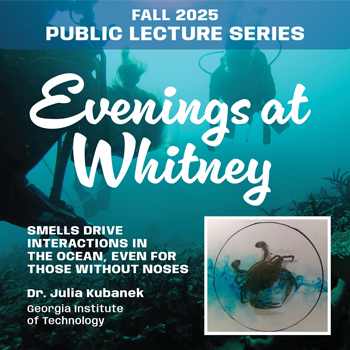
The University of Florida Whitney Laboratory for Marine Bioscience Evenings at Whitney Lecture Series continues Thursday, November 13, 2025, at 6 p.m. with the program titled “Smells drive interactions in the ocean, even for those without noses”. Dr. Julia Kubanek, School of Biological Sciences and School of Chemistry & Biochemistry, Georgia Institute of Technology, will be the speaker.
This free lecture will be presented in person at the UF Whitney Laboratory Lohman Auditorium, 9505 Ocean Shore Boulevard, in St. Augustine. Those interested also have the option of registering to watch via Zoom live the night of the lecture.
Register to watch online: https://ufl.zoom.us/webinar/register/WN_JpVM-NBdR2KufzJXcYIegg
In the murky waters of coastal estuaries, sight isn’t all that useful for animals living underwater. Even offshore where the water is clearer, many animals don’t have eyes or can sense only light and dark. Yet they have keen perceptions of each other and their environments, much of which is driven by smell. Even for those without noses, chemical cues are powerful indicators of where there is food, which way is home, and whether neighbors are potential mates or dangerous predators.
Throughout the world’s oceans, such dissolved chemicals diffuse and are transported by currents away from their source, delivering useful information to other organisms. When that source is a predator, downstream prey can use their perception of these chemical cues to respond to the threat by hiding, growing a thicker shell, or becoming more toxic. For example, metabolites in the urine of fish and crabs alert their prey (smaller crabs and oysters) to danger and the intensity of that danger is reflected in the chemical composition of the urine. These chemically mediated interactions affect which species co-exist in different ecosystems and help inform future conservation strategies.
Julia Kubanek is a Regents’ Professor at Georgia Institute of Technology jointly appointed in the School of Biological Sciences and the School of Chemistry & Biochemistry. Her areas of research interest include chemical signaling among organisms (especially in aquatic systems), natural products chemistry, metabolomics, chemical biology, and drug discovery. She and her students are interested in the fundamental functions and impacts of naturally occurring chemicals in the marine environment as well as their applications. They use an integrated approach to understand how marine natural products function as chemical cues in ecological interactions - working from the molecular to the community level. She joined the faculty at Georgia Tech in 2001. She was awarded the NSF CAREER Award in 2002, the Presidential Early Career Award for Scientists and Engineers (PECASE) in 2004, and was elected Fellow of the American Association for the Advancement of Science (AAAS) in 2012. From 2016 to 2024 she chaired the Scientific Advisory Board of the Max Planck Institute for Chemical Ecology. Kubanek received her B.Sc. in chemistry from Queen’s University, Canada, in 1991 and her Ph.D. in chemistry in at the University of British Columbia in 1998, and performed postdoctoral research at the University of California – San Diego and the University of North Carolina at Wilmington.
In addition to her faculty role, Dr. Kubanek serves as Georgia Tech’s Vice President for Interdisciplinary Research (VPIR). In her VPIR role, she oversees interdisciplinary research activities at Georgia Tech including the 11 interdisciplinary research institutes, which are faculty-led research, training, and outreach organizations each addressing cross-cutting themes of societal importance towards a sustainable planet, health and well-being, and prosperity shared by all. She also supports external research partnerships, especially with national labs and historically black colleges and universities. With others in the office of the Executive Vice President for Research (EVPR), she assembles interdisciplinary teams of Georgia Tech faculty and external partners to shape and respond to research opportunities, and joins the EVPR in setting strategic research directions for Georgia Tech. Dr. Kubanek held several previous leadership roles at Georgia Tech, including Associate Chair in the School of Biological Sciences (2009-2011) and Associate Dean for Research in the College of Sciences (2014-2021).